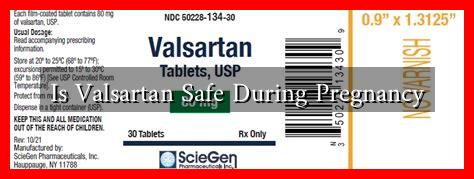-
Table of Contents
Is Valsartan Safe During Pregnancy?
Valsartan is an angiotensin II receptor blocker (ARB) commonly prescribed for managing high blood pressure and heart failure. However, its safety during pregnancy has raised significant concerns among healthcare professionals and expectant mothers. This article delves into the implications of using Valsartan during pregnancy, examining the potential risks, alternatives, and recommendations for pregnant women.
Understanding Valsartan and Its Uses
Valsartan works by relaxing blood vessels, which helps lower blood pressure and improve blood flow. It is often prescribed for conditions such as:
- Hypertension (high blood pressure)
- Heart failure
- Post-myocardial infarction (after a heart attack)
While effective for these conditions, the use of Valsartan during pregnancy is controversial due to its potential effects on fetal development.
Risks Associated with Valsartan During Pregnancy
Research indicates that the use of Valsartan during pregnancy, particularly in the second and third trimesters, can lead to serious complications. The primary concerns include:
- Fetal Development Issues: Valsartan has been associated with congenital malformations, particularly affecting the kidneys and cardiovascular system.
- Oligohydramnios: This condition, characterized by low amniotic fluid levels, can occur when Valsartan is taken during pregnancy, leading to complications such as fetal lung development issues.
- Neonatal Complications: Infants exposed to Valsartan in utero may experience hypotension, renal dysfunction, and other health issues after birth.
According to a study published in the American Journal of Obstetrics and Gynecology, the use of ARBs, including Valsartan, during pregnancy is linked to a higher risk of adverse outcomes compared to other antihypertensive medications.
Guidelines and Recommendations
Given the potential risks, healthcare providers generally advise against the use of Valsartan during pregnancy. The following guidelines are recommended:
- Consultation with Healthcare Providers: Pregnant women or those planning to conceive should discuss their medication regimen with their healthcare provider to evaluate the safety of their current medications.
- Alternative Medications: Safer alternatives for managing hypertension during pregnancy include methyldopa, labetalol, and nifedipine. These medications have a more established safety profile for use in pregnant women.
- Monitoring and Management: Regular monitoring of blood pressure and fetal health is crucial for pregnant women with hypertension. Adjustments to medication may be necessary as the pregnancy progresses.
Case Studies and Statistics
Several case studies highlight the risks associated with Valsartan during pregnancy. For instance, a retrospective cohort study involving over 1,000 pregnant women found that those exposed to ARBs had a significantly higher incidence of fetal malformations compared to those who were not exposed. Specifically, the study reported:
- A 20% increase in congenital anomalies among infants exposed to ARBs.
- A 15% higher risk of preterm birth in mothers taking these medications.
These findings underscore the importance of avoiding Valsartan and similar medications during pregnancy.
Conclusion
In summary, Valsartan is not considered safe for use during pregnancy due to its association with serious fetal risks and complications. Pregnant women or those planning to conceive should consult their healthcare providers to explore safer alternatives for managing hypertension. The health and safety of both the mother and the developing fetus should always be the top priority. By staying informed and proactive, expectant mothers can make the best choices for their health and the health of their babies.

